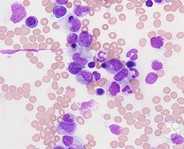Loh Lab
Mission
My career as a pediatric hematologist-oncologist has focused on conducting translational studies in childhood leukemia, specifically Acute Lymphoblastic Leukemia (ALL) and Juvenile Myelomonocytic Leukemia (JMML). I have been heavily involved with initiatives in the Children’s Oncology Group (COG) to improve risk stratification for childhood ALL. Within the COG, I am Vice Chair of Biology of the ALL Committee and was one of the Study Co-Chairs of AALL03B1, the Classification of Acute Lymphoblastic Leukemia. AALL03B1 was the largest risk stratification trial in the history of childhood leukemia research, having enrolled over 11,200 children. AALL03B1 incorporated clinical features, genetics of leukemia blasts, and measures of early response in order to identify the most appropriate therapies for subgroups of patients. Recently, we have identified a novel subgroup of patients with a number of kinase fusions or genetic alterations that will activate kinase signaling. FDA approved, shovel-ready drugs, such as dasatinib are available for such patients and the COG is beginning to test these patients for the presence of these lesions. In other work performed with colleagues from St Jude Children’s Research hospital, we described the genomic and biochemical landscape of hypodiploid ALL, a highly aggressive form of ALL with poor overall survival.
I also conduct translational studies in juvenile myelomonocytic leukemia and embarked upon research that has resulted in mapping out critical genetic lesions in JMML that are hypothesized to signal through hyperactivation of the Ras pathway, beginning with PTPN11 and recently concluding with the discovery of CBL mutations in JMML. My group described that CBL is a new famililal tumor suppressor gene. Together with my colleagues in the CLIA approved laboratory environment, we offer fee-for –service clinical testing for JMML associated mutations, including PTPN11, NRAS, KRAS, and CBL. We have also harnessed and developed phosphoflow cytometric methods in order to accurately map out perturbed signaling networks in subsets of primary leukemia cells, focusing first on JMML and are currently addressing signaling perturbations in ALL.
I am also keenly interested in developmental therapeutics and have served as Study Chair of a Phase I trial to assess the maximally tolerated dose of the JAK inhibitor, ruxolitinib, in children, in order to build upon laboratory observations that support the use of this compound in specific subsets of leukemia and JMML. Additional work will focus on testing the MEK inhibitor, Trametinib, in cohorts of patients with solid tumors and leukemia.
Projects
Despite improved outcomes for acute lymphoblastic leukemia (ALL), particular subsets of high-risk ALL, such as hypodiploid B-precursor ALL still have very poor outcomes. Our identification of Bcl-2 as a promising therapeutic target has led us to test specific classes of targeted Bcl-2 inhibitors (ABT-199, ABT 263) in cell lines and patient derived xenografts from hypodiploid ALL. We are currently conducting early phase clinical trials to validate our early in vitro Bcl-2 data, and test our hypothesis that inhibiting Bcl-2 will provide therapeutic efficacy.
Neurofibromatosis Type 1 (NF1) is a dominant cancer predisposition syndrome. Children with NF1 are predisposed to a variety of malignancies including low grade gliomas, plexiform neurofibromas and juvenile myelomonocytic leukemia (JMML), an aggressive myeloproliferative neoplasm that is incurable with conventional chemotherapy. We are now primed to carry out a phase II clinical trial using Trametinib, a best-in-class MEK inhibitor in children with JMML.
While cure rates for childhood acute lymphoblastic leukemia (ALL) approach 90% in the current era, relapse remains the most common cause of treatment failure and death. Advances in cancer genetics have recently made several important discoveries, such as the identification of a particular group of patients who display a “genetic signature” similar to that of Philadelphia (Ph) chromosome positive ALL; hence, known as Ph-like ALL. It has also been shown that these patients respond to a special group of chemotherapy agents called “tyrosine kinase inhibitors” (TKIs) such as imatinib and dasatinib. We hope that combining TKIs with chemotherapy will cure most of these patients but we anticipate that some may still relapse as a result of developing resistance to these TKIs, similar to how certain infections can become resistant to antibiotics. Therefore, the objective of our study is to identify how this resistance happens and to further identify new medicines that can be used to treat patients with relapsed Ph-like ALL.
 Juvenile myelomonocytic leukemia (JMML) is a type of blood cancer that affects children and is very difficult to treat. Currently available treatments cure only half of the patients with some children experiencing aggressive disease while others get better with very little treatment. No one knows why this happens. This project will use the latest breakthroughs in scientific technology to determine how we can distinguish one group from the other at diagnosis so that patients can receive the appropriate amount of therapy.
Juvenile myelomonocytic leukemia (JMML) is a type of blood cancer that affects children and is very difficult to treat. Currently available treatments cure only half of the patients with some children experiencing aggressive disease while others get better with very little treatment. No one knows why this happens. This project will use the latest breakthroughs in scientific technology to determine how we can distinguish one group from the other at diagnosis so that patients can receive the appropriate amount of therapy.
Image credit: American Society of Hematology Image Bank
Lab News
- abril 15, 2022 Mignon Loh to Head Cancer and Blood Disorder Care and Research at Seattle Children’s
- febrero 1, 2022 Seattle Children’s Welcomes Dr. Mignon Loh to Lead Cancer and Blood Disorders Care and Research
- febrero 28, 2016 VP Joe Biden Visits UCSF to Advance National Cancer Moonshot Initiative
Questions? Contact Us:
Email: info.btccr@seattlechildrens.org
TEL: 206-884-4044
